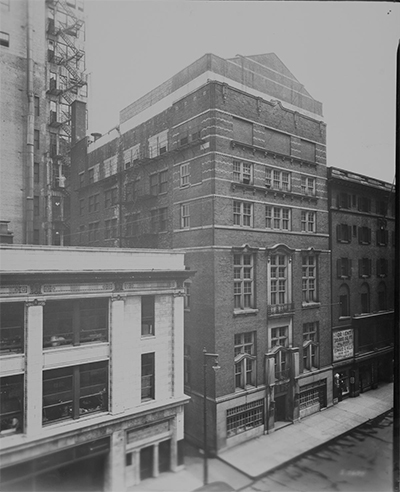History of the Law School
Beginnings Heading link

Established in 1899, The John Marshall Law School opened its doors as an independent institution of access and opportunity. From its earliest beginnings, the Law School instilled in its graduates the belief that an attorney, above all else, must earn the public’s trust by acquiring the knowledge, skills, experience, and values essential to fulfilling their responsibilities to the justice system and to those whom the profession serves.
The first courses at the Law School, offered as part of evening and part-time programs, provided access to a legal education for those who were otherwise denied a legal education—women, minorities, and working-class students. Jessie Cook (1903), the first female graduate; James Randle (1904), the first Black graduate; and William Rodriguez (1912), the first Hispanic graduate, earned their degrees and became pioneering alumni, but they are only a few of those who broke barriers. In the years that followed, hundreds of trailblazing attorneys and advocates made their marks in public service, private practice, and on the bench.
Read Our Story A Centennial History (1899-1999)
A Legacy of Leadership Heading link
A founding member of the institution, Edward T. Lee accepted the position of Dean in 1909, becoming its third dean, and it was under his guidance that the Law School became a Chicago institution. Dean Lee nurtured the Law School’s learning environment and assembled a remarkable part-time faculty of practicing attorneys. Throughout his 34-year tenure, Dean Lee repeatedly argued with members of the legal community and advocated that society needed law school programs that were all-inclusive and that The John Marshall Law School embodied this approach.
Noble W. Lee followed his father as Dean, serving from 1944 through 1974. During his tenure, The John Marshall Law School was approved by the American Bar Association in 1951. Throughout the 1960s, Dean Lee continued to stress to the legal community the importance of a part-time curriculum and the advantages the Law School offered to students who otherwise would not have the privilege of earning a law degree.
Fred F. Herzog, who succeeded Noble Lee as dean, is credited with transforming the Law School’s rigorous academic standards, developing a full-time faculty, and improving the institution’s facilities. As a result of his initiatives, The John Marshall Law School achieved membership in the Association of American Law Schools.
The Law School’s subsequent deans wrote their own chapters in the Law School’s history, and those who graduated under their leadership further amplified the effect of their accomplishments by earning their own honored success.
Pioneering Curriculum Heading link
Through the years, the Law School’s faculty members have also greatly contributed to the institution’s lasting excellence. Their national and international reputations for research, writing, and instruction have provided the foundation for timely programs in emerging disciplines, as well as the institution’s current hallmarks of Legal Writing, Intellectual Property Law, and Trial Advocacy.
In 1934, the Law School offered its first classes in what became known as Intellectual Property Law. In 1980, recognizing the emerging importance of law and technology, faculty established the nation’s first Information Technology and Privacy Law program. In 1998, the Law School became the first to offer a graduate law degree in Employee Benefits. And the Law School, known for requiring its students to complete one of the most extensive practical lawyering-skills curricula in the country, became among the first to mandate its students earn credit through an externship or clinical experience. This requirement further ensured future graduates would enter the profession equipped with the practice-ready skills for which the Law School has long been recognized.
The Lasting Lineage Heading link
The legacy of opportunity first envisioned by the Law School’s founders continues. Each of the Law School’s deans provided a vision in and for their times that gave depth and meaning to the Law School’s mission of teaching both the theory and practice of law while responding to the challenges of their day. In kind, the Law School’s faculty have stewarded that aim, crafting an evolving curriculum that molded those who have undertaken its rigors. The presidents and boards, too, of the institution’s SBA, Alumni Associations, and Board of Trustees have contributed to the annals of the Law School and thus forged its future.
But the greater history of the Law School is told through the collective impact and achievement of its more than 19,000 alumni. Their contributions live as proof of the institution’s founding ideals and serve as a beacon to future graduates, a light by which to follow forward and pave the gravel along the path to justice.